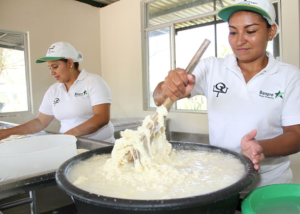A healthy and safe diet, which allows adequate development and health, is a fundamental right for everyone. Ensuring food safety is a priority issue for the industry, consumers, and governments, which has become even more relevant in the context of the health crisis caused by COVID-19, since foodborne diseases, although they can be prevented, continue to be a major problem that impacts health systems and also has strong economic implications for those involved.
 Currently, Costa Rica leads the production, export, and import of dairy products in Central America. Globally, the consumption and production of these artisanal and small-scale products have increased. The formal Costa Rican dairy industry represents 60% of production, while artisan producers account for around 40%, of which approximately 30% are cheese producers.
Currently, Costa Rica leads the production, export, and import of dairy products in Central America. Globally, the consumption and production of these artisanal and small-scale products have increased. The formal Costa Rican dairy industry represents 60% of production, while artisan producers account for around 40%, of which approximately 30% are cheese producers.
In an effort to generate science-based technical recommendations to support this productive sector and thereby contribute to the prevention of foodborne diseases, the CITA of the UCR, supported by funding from ILSI (International Institute of Life Sciences), was He undertook the task of documenting the steps to be followed to safely produce three Costa Rican dairy products: Palmito cheese, Bagaces cheese, and sour milk. For this, a research project was developed in which three final graduation projects were carried out for the Bachelor’s Degree in Food Engineering, which allowed the graduation of the engineers Gloriana Rodríguez, Lourdes Chacón, and Marcela Espinoza.
We present the article (in Spanish) on the Process Guides to guarantee the safety of three Costa Rican artisanal dairy products (pages 29-33)